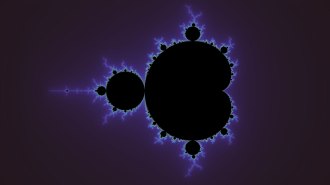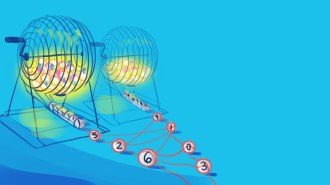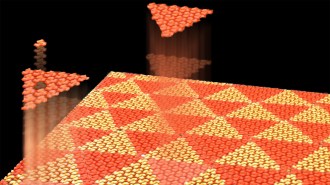Rules for computing classical probabilities might depend on quantum randomness
- More than 2 years ago
For all the deference to “laws” of nature that supposedly govern everything that happens, the truth is that randomness rules the world.
Everywhere you look, randomness is at work, in all the processes described by the mathematics of probability. The temperature of the air and the capriciousness of the weather all depend on random collisions of molecules. Computers operate on the principles of information theory, which is rooted in quantifying probabilities. Time rushes onward and disorder replaces order by virtue of the probabilistic second law of thermodynamics. Randomness determines everything from who gets real medicine in clinical trials to which team gets the ball first at football games.
Yet despite its pervasive importance, randomness has always remained rather mysterious. It’s not easy to define, and nobody has ever articulated very clearly exactly where randomness comes from — at least not to every scientist’s satisfaction.
There is one surefire source of randomness, though: quantum physics. For atoms and molecules, quantum physics requires randomness that cannot be evaded. An electron might be found in any of a number of locations; quantum physics can’t tell you where it will be, but does permit computing the odds for the various possibilities.
But it’s hard to see what quantum randomness has to do with randomness in the macroscopic world. Quantum uncertainty in the location of a penny is much smaller than one of the hairs on Lincoln’s head. It doesn’t seem likely that randomness in the quantum world is relevant to the realm of coins and dice and Wheel of Fortune. For things like that, “classical” probability theory seems to work well enough. Quantum considerations are ignored.
Unfortunately, though, classical probability has no real claim to validity, except perhaps its success in keeping casinos in business.
“There has not been any systematic validation of purely classical probabilities,” write physicists Andreas Albrecht and Daniel Phillips. Classical probability theory, they say, just quantifies ignorance about all the factors that determine exactly where the ball will fall in the roulette wheel or when your hand will catch a flipped penny. It doesn’t tell you why that ignorance exists.
So suppose, argue Albrecht and Phillips, that the ignorance quantified by classical probability theory is “rooted in specific physical properties of the world around us.” In that case, “the things we call ‘classical probabilities’ can be seen as originating in the quantum probabilities that govern the microscopic world.”
Large-scale fluctuations in gases and liquids, for instance, can be traced back to quantum randomness on the molecular level, Albrecht and Phillips contend in a new paper, online at arXiv.org. They calculate how tiny quantum uncertainties can propagate upward in a larger system. Even in billiards, these calculations show, after only eight collisions quantum uncertainty becomes a factor in determining which balls will collide next.
Similarly, in flipping a coin, quantum uncertainties at the molecular level can influence why heads and tails turn up at random. If you flipped a coin with a perfect machine, imparting precisely the same amount of momentum each time, you’d always get the same result. But when you flip a penny with your thumb, you can’t control exactly how many times the coin spins before you catch it. Precise timing of the initial flip and the catch is limited by your brain’s control of your muscles, which in turn depends on protein molecules operating in nerve cells. Those protein molecules are buffeted by water molecules with fluctuating frequency stemming from quantum randomness.
“We have a plausibility argument that the outcome of a coin flip is truly a quantum measurement,” write Albrecht and Phillips, of the University of California, Davis. “The 50-50 outcome of a coin toss may in principle be derived from quantum physics … with no reference to classical notions of how we must ‘quantify our ignorance.’ ”
Albrecht and Phillips are concerned with probability because of its role in theories that picture the universe as only one in a multiplicity of spaces known as the multiverse. In analyzing multiverse theories, physicists frequently encounter circumstances where quantum math does not permit probabilistic computation (as with questions such as how many of all possible universes could support life). In situations where quantum math does not permit probabilities to be computed, physicists resort to classical probability theory. But if classical probabilities are actually quantum in origin, then it makes no sense to use them, either, if the quantum math says probabilities can’t be calculated.
“Our claim is that probabilities are only proven and reliable tools if they have clear values determined from the quantum state,” Albrecht and Phillips write.
Consequently current theories of the multiverse should be regarded with suspicion, Albrecht and Phillips remark. And if quantum physics really is the basis for all real-life probabilities, no doubt there will be further ramifications of this realization. It might even be a good idea to replace football referees with quantum physicists.
SN Prime | January 21, 2013 | Vol. 3, No. 4






